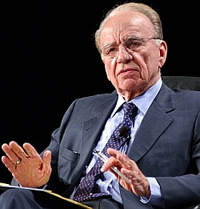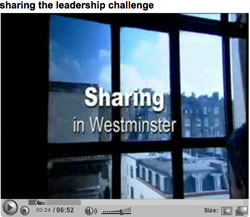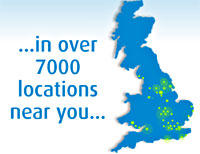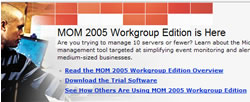 In an ideal world, waiting near the top of the new OFCOM boss Ed Richards’ in-tray, there should be a folder marked ‘Sky Monopoly’ and on it a brightly coloured post-it with the words anti competitive clearly inscribed.
In an ideal world, waiting near the top of the new OFCOM boss Ed Richards’ in-tray, there should be a folder marked ‘Sky Monopoly’ and on it a brightly coloured post-it with the words anti competitive clearly inscribed.
Digital Television is a standards based system with the majority of the world using a system called DVB (the Americans have something called ATSC but that’s a story for another day), the UK’s Sky TV uses the DVB standard in most respects.
Pay TV operations rely on a system of Conditional Access (CA) where channels are encrypted, viewers with a suitable viewing card can decrypt the services they subscribe to, those who don’t subscribe don’t get.
To enable the pay services to operate with the use of ‘viewing cards’ the DVB system has a standard, the standard allows for different viewing cards to co-exist and for TV services to be encrypted by more than one encryption method at a time, the so called Simulcrypt (Simultaneous encryption, get it?).
 The area where Sky has decided not to use DVB is for its Conditional Access encryption.
The area where Sky has decided not to use DVB is for its Conditional Access encryption.
Sky TV which is controlled by News Corporation, the large multinational media company with Rupert Murdoch at the helm, uses a special tailored version of Conditional Access a variant of Videoguard which is produced by a company called NDS that is in turn, majority owned by News Corporation.
Now you might be curious to know why this matters, well as the majority of UK householders who watch digital TV, watch via a Sky TV satellite ‘digibox’ and to have a channel that can be easily received via Sky TV the channel must contract with Sky TV to appear on the Sky Electronic Programme Guide, commonly referred to as the EPG.
 If that TV service then wants to charge the subscribers to their service they have to use that special version of Videoguard CA.
If that TV service then wants to charge the subscribers to their service they have to use that special version of Videoguard CA.
So what can be done about it? Well OFCOM can and should mandate Sky TV to open up its platform to other DVB CA systems and new entrants can then offer smaller niche services and a new competitive platform to Sky should emerge.
The BBC has for some time been promising a Freeview alternative to the UK’s dominant pay TV operation Sky Digital, but with it’s struggle with the government to secure a long term above inflation licence fee settlement and its desire to start a High Definition TV service, this cause has been relegated to the back burner.
As the government ordained switchover date looms ever closer, viewers who can only receive digital TV by satellite should be able to choose a non Sky alternative even at the risk of upsetting a powerful media mogul.
 Ofcom has announced that Ed Richards is taking over the uber-communications agency CEO reigns, effective today.
Ofcom has announced that Ed Richards is taking over the uber-communications agency CEO reigns, effective today. * Ensuring that Ofcom’s voice is heard on key issues. Ofcom to its credit, tend to think and act in an evidence-based manner, but are surrounded by a regulatory environment which is highly politicised. This has been particularly true in both the media and new media, an area where Stephen Carter’s Ofcom often produced good thinking, but was unable to translate that into actual policy (eg, BBC charter review). Richards comes from the political world, and this might benefit Ofcom in that respect.
* Ensuring that Ofcom’s voice is heard on key issues. Ofcom to its credit, tend to think and act in an evidence-based manner, but are surrounded by a regulatory environment which is highly politicised. This has been particularly true in both the media and new media, an area where Stephen Carter’s Ofcom often produced good thinking, but was unable to translate that into actual policy (eg, BBC charter review). Richards comes from the political world, and this might benefit Ofcom in that respect. The UK’s broadcasting and telecommunications regulator OFCOM last week made clear its opposition to potential EU regulation. It fears it will straight-jacket the emerging new wave industries aiming to propel high tech growth in the EU zone over the coming years.
The UK’s broadcasting and telecommunications regulator OFCOM last week made clear its opposition to potential EU regulation. It fears it will straight-jacket the emerging new wave industries aiming to propel high tech growth in the EU zone over the coming years. The study also makes clear its’ worries that excessive regulation could mean that countries outside of the EU would benefit from the expected growth in non traditional delivery of multimedia content, before it has established itself in Europe.
The study also makes clear its’ worries that excessive regulation could mean that countries outside of the EU would benefit from the expected growth in non traditional delivery of multimedia content, before it has established itself in Europe. The news that OFCOM is to review its position on Voice Over IP services (VOIP) – the way we can make low cost or free phone and video calls currently from our PC’s generally using call centre-type headsets – is part of the evolution of these types of service from guerrilla geek to middle class mainstream. Now that Tesco’s are marketing VOIP services it’s fair to say that it’s a ‘regular’ service/product.
The news that OFCOM is to review its position on Voice Over IP services (VOIP) – the way we can make low cost or free phone and video calls currently from our PC’s generally using call centre-type headsets – is part of the evolution of these types of service from guerrilla geek to middle class mainstream. Now that Tesco’s are marketing VOIP services it’s fair to say that it’s a ‘regular’ service/product. Prices for the new device are not yet released, but industry observers are talking of a figure around a £100 to make this potentially cost saving purchase.
Prices for the new device are not yet released, but industry observers are talking of a figure around a £100 to make this potentially cost saving purchase. DAB in the UK has had a good week with prices dropping to an all time low, with High Street retailers are now making available a DAB radio with CD player for under £50.
DAB in the UK has had a good week with prices dropping to an all time low, with High Street retailers are now making available a DAB radio with CD player for under £50. Sky’s satellite hybrid
Sky’s satellite hybrid  The UK Government have put two of their videos up on YouTube – for all the world to enjoy.
The UK Government have put two of their videos up on YouTube – for all the world to enjoy. The Death of YouTube?
The Death of YouTube? UK regulator Ofcom is looking at plans to introduce high speed Internet access to broadband-starved remote areas by boosting the power of Wi-Fi signals.
UK regulator Ofcom is looking at plans to introduce high speed Internet access to broadband-starved remote areas by boosting the power of Wi-Fi signals. City networks
City networks Ruckus, who are currently working with Google to test a free mesh network in Mountain View, California, have developed a new Wi-Fi antenna to help home users connect to city networks.
Ruckus, who are currently working with Google to test a free mesh network in Mountain View, California, have developed a new Wi-Fi antenna to help home users connect to city networks. Today it was announced that Whitehaven, Cumbria will be the first area in England to have its TV reception changed over from analog to digital.
Today it was announced that Whitehaven, Cumbria will be the first area in England to have its TV reception changed over from analog to digital. Microsoft have been fined by the European Commission for failing to comply with an anti-competitive ruling.
Microsoft have been fined by the European Commission for failing to comply with an anti-competitive ruling. Competition Commissioner Neelie Kroes was quoted by Reuters as saying, “Microsoft has still not put an end to its illegal conduct. I have no alternative but to levy penalty payments for this continued non-compliance. No company is above the law.”
Competition Commissioner Neelie Kroes was quoted by Reuters as saying, “Microsoft has still not put an end to its illegal conduct. I have no alternative but to levy penalty payments for this continued non-compliance. No company is above the law.” Shaun Woodward (right) the MP famed for the twin disgraces of his defection from the Conservatives to Labour and a stint working with Esther Rantzen on That’s Life, is now Creative Industries minister and is busy singing the virtues of the UK’s Digital TV switchover plans.
Shaun Woodward (right) the MP famed for the twin disgraces of his defection from the Conservatives to Labour and a stint working with Esther Rantzen on That’s Life, is now Creative Industries minister and is busy singing the virtues of the UK’s Digital TV switchover plans. Digital UK had the current 98.5% coverage as a target and expects to meet this with additional coverage being by satellite, cable and broadband. Current figures indicate a rump of around 2% of refuseniks, those viewers content with a meagre 4 or 5 channels who see no value in multi-channel viewing, but expectations are this number will shrink as the digitisation spreads across the country like a warm front.
Digital UK had the current 98.5% coverage as a target and expects to meet this with additional coverage being by satellite, cable and broadband. Current figures indicate a rump of around 2% of refuseniks, those viewers content with a meagre 4 or 5 channels who see no value in multi-channel viewing, but expectations are this number will shrink as the digitisation spreads across the country like a warm front.